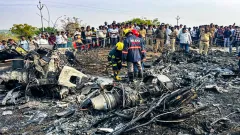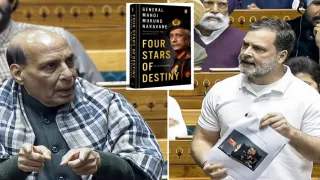Born on October 15, 1931, in Rameswaram, Tamil Nadu, Dr. A.P.J. Abdul Kalam rose from humble beginnings to become one of India’s most admired scientists and statesmen. Known as the “Missile Man of India” for his pioneering work in defense technology and as the “People’s President” for his humility and vision, Kalam dedicated his life to advancing science, education, and national development. His story remains a powerful symbol of how perseverance, integrity, and hard work can transform even the most ordinary beginnings into extraordinary success.
Throughout his life, Dr. Kalam combined his deep spirituality with scientific innovation, inspiring millions of Indians to dream big and work relentlessly toward their goals. His legacy continues to inspire students, scientists, and leaders across the world — a true testament to his belief that greatness lies in service to humanity.
Early Life and Education
Avul Pakir Jainulabdeen Abdul Kalam was born into a modest Muslim family in Rameswaram. His father, Jainulabdeen, owned a small boat, and his mother, Ashiamma, was a homemaker. Despite the family’s financial struggles, young Kalam showed an early passion for learning and helping others. He sold newspapers as a child to support his education while maintaining a keen interest in mathematics and science.
He completed his schooling in Rameswaram and earned a degree in physics from St. Joseph’s College, Tiruchirapalli, in 1954. Later, he pursued aerospace engineering at the Madras Institute of Technology (MIT). His brilliance and persistence impressed his mentors, and soon after graduation, he joined India’s Defense Research and Development Organisation (DRDO), beginning a career that would redefine the nation’s technological capabilities.
Scientific Career and Space Achievements
In 1958, Kalam began working at DRDO on small aircraft projects but moved to the Indian Space Research Organisation (ISRO) in 1969. There, he served as the Project Director of India’s first Satellite Launch Vehicle (SLV-III), which successfully placed the Rohini satellite in orbit in 1980. This achievement marked India’s entry into the elite group of nations with indigenous satellite launch capabilities.
Under Kalam’s leadership, India made groundbreaking advances in space technology. His work on developing the SLV-III and the Polar Satellite Launch Vehicle (PSLV) helped lay the foundation for ISRO’s later successes. Kalam’s vision for a self-reliant India guided his teams to think creatively and pursue technological excellence even with limited resources.
Missile and Nuclear Program
After his remarkable contributions at ISRO, Kalam rejoined DRDO in 1982 to lead the Integrated Guided Missile Development Programme (IGMDP). This initiative produced a series of indigenous missiles, including Agni (an intermediate-range ballistic missile) and Prithvi (a surface-to-surface tactical missile), earning him the title “Missile Man of India.”
From 1992 to 1999, Kalam served as the Scientific Adviser to the Defence Minister and later as the Principal Scientific Adviser to the Government of India. He played a crucial role in the 1998 Pokhran-II nuclear tests, which established India as a nuclear power. Despite international criticism, Kalam’s leadership and technical expertise were hailed across the nation. He also initiated the Technology Vision 2020 program, aiming to make India a developed nation through innovation in education, agriculture, and industry.
Presidency and Political Life
In 2002, Dr. Kalam was elected as the 11th President of India with overwhelming support from across political parties. Known for his simplicity and accessibility, he transformed the largely ceremonial post into a platform for youth engagement and education reform. His approachable nature earned him the affectionate title of “People’s President.”
During his term (2002–2007), he inspired millions by visiting schools and universities, encouraging students to dream and work for a prosperous India. He often said, “The youth of India must think and act as the engine of national growth.” Even after his presidency, Kalam continued to teach and lecture across the country, sharing his vision for a technologically advanced and morally strong India.
Books and Writings
Dr. Kalam was a prolific writer whose books continue to inspire readers worldwide. His autobiography, Wings of Fire, is a timeless account of his journey from Rameswaram to Rashtrapati Bhavan. Other significant works include Ignited Minds, India 2020, My Journey, Indomitable Spirit, Target 3 Billion, and Transcendence. His books blend science, philosophy, and motivation, emphasizing leadership, innovation, and the power of youth.
He also wrote poetry and spiritual reflections, often expressing his deep belief in the unity of science and spirituality. His works such as The Luminous Sparks and Forge Your Future highlight his desire to inspire self-belief and social responsibility among India’s youth.
Awards and Recognition
Dr. Kalam received numerous national and international awards for his contributions to science and society. He was conferred with India’s highest civilian honors — the Padma Bhushan (1981), the Padma Vibhushan (1990), and the Bharat Ratna (1997). These awards recognized his role in advancing India’s defense capabilities and promoting scientific temper among citizens.
He also received honorary doctorates from over 40 universities and global institutions. In 2013, the United Nations declared his birthday, October 15, as World Students’ Day in recognition of his lifelong dedication to teaching and inspiring youth.
Institutions and Memorials Named After Him
Following his passing in 2015, numerous institutions, landmarks, and programs were named in his honor to preserve his legacy and vision. Wheeler Island in Odisha, used for missile testing, was renamed Abdul Kalam Island. The DRDO Missile Complex in Hyderabad became the Dr. A.P.J. Abdul Kalam Missile Complex, celebrating his pioneering defense work.
Several educational and research institutions bear his name, including the Dr. A.P.J. Abdul Kalam Technical University (Lucknow), Dr. A.P.J. Abdul Kalam Government Arts and Science College (Rameswaram), and the Kalam Institute of Health Technology (Visakhapatnam). Additionally, roads, scholarships, and libraries across India have been dedicated to him, reflecting his lasting impact on education and innovation.
In his hometown of Rameswaram, the Dr. A.P.J. Abdul Kalam National Memorial was inaugurated in 2017. It showcases his life’s work, awards, writings, and personal belongings, serving as a national tribute to his legacy. The memorial attracts thousands of visitors each year who come to pay their respects to one of India’s greatest sons.
Philosophy, Values, and Quotes
Dr. Kalam’s philosophy centered on the power of dreams, discipline, and determination. He believed that every individual has the ability to make a difference. His famous words, “Dream, dream, dream. Dreams transform into thoughts and thoughts result in action,” encapsulate his vision for personal and national progress. He often emphasized that success is born out of perseverance, not privilege.
He saw no conflict between science and spirituality, often stating that both are essential for the prosperity of humanity. His teachings encouraged youth to combine knowledge with compassion and moral strength. Some of his most memorable quotes include:
- “You have to dream before your dreams can come true.”
- “If you want to shine like the sun, first burn like the sun.”
- “Don’t take rest after your first victory because if you fail in the second, more lips are waiting to say that your first victory was just luck.”
- “Man needs his difficulties because they are necessary to enjoy success.”
- “Excellence is a continuous process, not an accident.”
Dr. Kalam’s values of simplicity, humility, and dedication continue to influence millions. He lived by example — remaining grounded despite global fame — and encouraged others to focus on integrity, innovation, and selfless service.
Legacy and Passing
On July 27, 2015, while delivering a lecture at the Indian Institute of Management, Shillong, Dr. Kalam collapsed and passed away due to cardiac arrest. He died doing what he loved most — inspiring young minds. The nation mourned the loss of a visionary leader, and he was laid to rest with full state honors in his hometown, Rameswaram.
Dr. A.P.J. Abdul Kalam’s life remains a guiding light for India and the world. His journey from a small coastal town to the highest office of the country reflects the limitless power of education, perseverance, and vision. His message — that “great dreams of great dreamers are always transcended” — continues to ignite minds and hearts, reminding everyone that true greatness lies in serving others and striving for a better tomorrow.
Also Read: Google’s $15B India AI Data Center: Biggest Investment Ever























